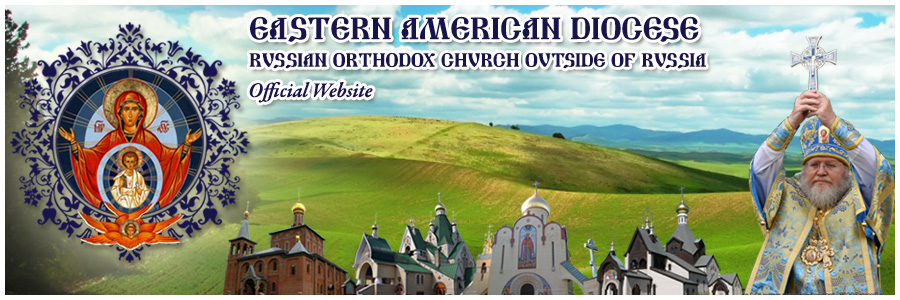Русская
Версия
The Earthly
Life of the Mother of God
E. Poselianin
Dormition
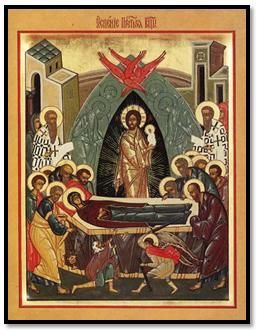 Once, while
the Mother of God was praying, the Archangel Gabriel appeared before
her and brought her the joyous news of her imminent repose, which he
said would occur in three days.
Once, while
the Mother of God was praying, the Archangel Gabriel appeared before
her and brought her the joyous news of her imminent repose, which he
said would occur in three days.
As a sign,
the Archangel, herald of the good tidings gave the Most Holy Virgin a
branch from Paradise. It was the branch from a fig tree that shone
with the light of heavenly grace. This branch was to be carried before
Her funerary bier during the burial procession of her Most-honored and
Most-pure Body. A great joy entered her heart at the Archangel's good
news. She bowed down to the ground and with all her strength, thanked
her Creator.
It was the
Most-pure Virgin's wish that, at the time of Her repose, she see the
Holy Apostles who were dispersed around the world preaching, and not
see the prince of darkness and his horrors at the hour of her
departure. She prayed to her Son and Lord that her wish be granted,
and that He Himself, accompanied by the Holy Angels, accept her Holy
Soul into His Divine hands, as He had previously promised.
When the
Mother of God returned home after this, her final prayer in the
Gethsemane vineyard, all were amazed at the incomprehensible Divine
power and glory surrounding.
The Mother
of God related her revelation to the beloved John, her adopted son,
showed him the light-bearing branch given Her by the angel, and
directed him to carry it before her funerary bier. John immediately
sent messengers to St James, the brother of the Lord and first bishop
of Jerusalem, and to all the relatives and close acquaintances of the
Mother of God, announcing Her imminent repose, relating the very day
of her departure. St James sent news of this to all the faithful in
Jerusalem and in all of the outlying cities and towns.
All those
gathered by the Most-pure Virgin wept on hearing from Her own lips the
news of Her repose.
"Do
not weep," the Mother of God said to them, "but rejoice in
my departure. I will not leave you orphaned, and not only you, but the
whole world. I will visit you and protect you, and will help those in
need."
With such
comforting words, the Mother of God consoled the weeping people
surrounding Her, alleviating their sadness. She directed that She be
buried in Gethsemane, near Jerusalem, at the Mount of Olives, where
her righteous parents and Joseph the Betrothed were buried.
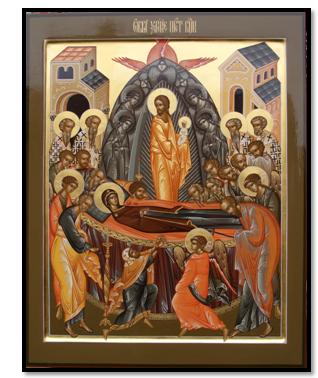 At God's
order, Angels of the Lord suddenly took up the Holy Apostles from
faraway places, brought them on clouds to Jerusalem and deposited
them, before the doors of the house of the Most Holy Theotokos on
Zion. They were both overjoyed to see one another, and also wondering
in amazement as to why the Lord had gathered them together. Apostle
John the Theologian came out and greeted them in tears; he announced
to them the imminent departure of the Most-holy Theotokos from this
worldly life. The Holy Apostles understood that the Lord had gathered
them from all parts of the world so that they might be present at the
repose of His Most-pure Mother, and bury her Most-holy body with
honor. The Apostles grieved over their coming separation from the Most
Holy Virgin Mary.
At God's
order, Angels of the Lord suddenly took up the Holy Apostles from
faraway places, brought them on clouds to Jerusalem and deposited
them, before the doors of the house of the Most Holy Theotokos on
Zion. They were both overjoyed to see one another, and also wondering
in amazement as to why the Lord had gathered them together. Apostle
John the Theologian came out and greeted them in tears; he announced
to them the imminent departure of the Most-holy Theotokos from this
worldly life. The Holy Apostles understood that the Lord had gathered
them from all parts of the world so that they might be present at the
repose of His Most-pure Mother, and bury her Most-holy body with
honor. The Apostles grieved over their coming separation from the Most
Holy Virgin Mary.
On entering
the house, all of them saw the Mother of God, filled with spiritual
joy, sitting peacefully on the bed.
The 15th
day of August came; the long-awaited, blessed hour in which the
Most-Holy Theotokos was to be translated, had arrived.
Many
candles were lit and the Apostles chanted the doxology. In preparation
for her blessed departure, the Most-immaculate Virgin lay on a
decorated bier, and awaited the arrival of her most desired Son and
Lord.
And He,
Whom she had conceived without sin, to Whom she had given birth
without pain, painlessly accepted her Most-pure soul from her Holy
Body, not giving it over to corruption. Then began the joyous and
sweet Angelic singing, in which could be heard oft-repeated words that
the Archangel Gabriel had once brought from Heaven to the Virgin in
Nazareth: "Rejoice, Full of Grace, the Lord is with Thee, blessed
art Thou among women!"
Thus,
escorted in pomp by all of the ranks of the hosts of Heaven, carried
in the arms of the Lord, Mariam's soul quietly ascended to the
dwellings above...
The Earthly
life of the Mother of God - Part 17 E. Poselianin
St. Peter,
together with St. Paul and St. James, brother of the Lord, and with
the other Apostles, lifted the bier onto their shoulders, and St. John
the Theologian carried before the bier the radiant branch from
Paradise. The rest of the gathered saints and multitude of people,
carrying candles and censers, walked along and sang. The Apostle Peter
would intone the chant, and the rest would join in with him.
It was with
such pomp that the body of the Most-immaculate Virgin, which had
received God into itself, was carried from Zion, through Jerusalem,
and to the village of Gethsemane.
Hearing the
strange chanting and seeing the solemn procession with the body of
Mary, the people of Jerusalem, non-believing Jews, came out of their
houses and followed the crowd, wondering at the great pomp and honor
being accorded the body of the mother of Jesus. On hearing of this,
the high priests and levites, incensed with envy and hatred, sent
servants and soldiers with instructions to incite many in the crowd to
use weapons and staves to disperse the people accompanying Mary's
body, to beat up Jesus' disciples, and to put the body of the
Theotokos to the torch. When, armed as for battle, those intent on
this evil course attacked the procession, a cloud that had been moving
across the sky suddenly descended to ground level; a circle of cloud,
surrounded the Apostles and all those accompanying them forming a wall
through which the sounds of their chanting could be heard, but they
themselves could not be seen.
Holy
Angels, invisibly hovering over the most-immaculate body and the
assembly of the faithful, struck the evildoers blind, so that some
struck the city wall and sustained head injuries, while others, not
knowing where to go, groped their way along the walls and searched for
someone to guide them.
A Jewish
priest named Athonios happened to be on that path. God ensured that at
that precise moment, the circle of cloud again ascended, and Athonios
was able to see the Holy Apostles and the multitude of faithful,
carrying candles and singing psalms, surrounding the Most-immaculate
Theotokos' bier. Rekindling his former enmity toward the Lord, he
became enflamed with hatred, and said, "This body, which gave
birth to that Liar who violated the law of our fathers, is being
accorded such honor!" Physically strong, and filled with hatred,
he savagely threw himself at the bier, intending to cast the most-pure
body of Our Lady to the ground. As soon as his hands had dared touch
the bier, they were suddenly cut off as if by the invisible,
incorporeal sword of God's vengeance, and his hands remained fixed to
the bier, while Athonios fell to the ground, crying "Woe, is me,
woe!"
Recognizing
that he had sinned, he repented and called to the Apostles, "Have
mercy on me, o servants of Christ!"
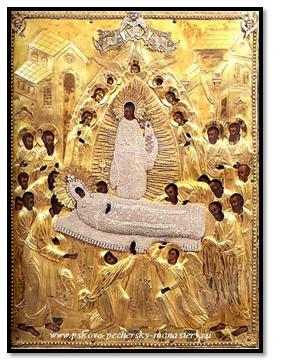 The Apostle
Peter ordered him to stand next to the bier, and said, "Well, you
have gotten what you wanted. Understand that God's vengeance has
ensued. We cannot heal your wounds. The only one who can heal you is
the One Whom you unjustly oppose and Whom you killed - our Lord. Yet
He will not want to grant you healing until you have believed on Him
with your entire heart, until you have confessed with your lips that
Jesus is the true Messiah, the Son of God." Athonios cried out,
"I believe that He is the Savior of the world, whom the prophets
had foretold, He is the Christ. We had already seen in Him the Son of
God, but clouded by hatred and envy, did not want to confess Him to be
God and subjected him to death without a cause. Through the power of
God He arose from the dead on the third day, filling all of us who
hated him, with shame. We strove to hide the fact of His Resurrection
and to that end bribed the guards, but we could not put a stop to the
Lord's fame or to the news about the miracle that spread
everywhere."
The Apostle
Peter ordered him to stand next to the bier, and said, "Well, you
have gotten what you wanted. Understand that God's vengeance has
ensued. We cannot heal your wounds. The only one who can heal you is
the One Whom you unjustly oppose and Whom you killed - our Lord. Yet
He will not want to grant you healing until you have believed on Him
with your entire heart, until you have confessed with your lips that
Jesus is the true Messiah, the Son of God." Athonios cried out,
"I believe that He is the Savior of the world, whom the prophets
had foretold, He is the Christ. We had already seen in Him the Son of
God, but clouded by hatred and envy, did not want to confess Him to be
God and subjected him to death without a cause. Through the power of
God He arose from the dead on the third day, filling all of us who
hated him, with shame. We strove to hide the fact of His Resurrection
and to that end bribed the guards, but we could not put a stop to the
Lord's fame or to the news about the miracle that spread
everywhere."
Thus did
Athonios confess his past transgressions and repent of the audacious
sin he had just committed.
The Holy
Apostles and the faithful rejoiced, as do the angels when a sinner
repents, and Peter ordered Athonios to touch his arms to the severed
parts hanging from the bier; with faith he invoked the name of the
Most-immaculate Lady Theotokos. When Athonios had done as he had been
ordered, the severed members were suddenly properly rejoined, the
joints met were completely healed; only a red line near the elbows
that encircled each arm remained, as a sign that the arms had been
severed.
Then
Athonios prostrated himself before the bier, bowing down before Christ
God Who had been born of the Most-immaculate Lady. He uttered lengthy
and loud praises of the Mother of God, noting the Old Testament
prophecies about her.
Arriving
with the multitude of the faithful at Gethsemane, the Holy Apostles
placed the bier with the Most-Immaculate Body near the tomb. When,
toward evening, they had placed the body in the tomb and leaned a
heavy stone against the cave opening, they found that for a long time
they could not bring themselves to leave the tomb, as if they were
fettered to it by their love for the Mother of God.
At God's
discretion, Thomas, one of the Holy Apostles, was not present at the
burial of the body of the Most-immaculate Theotokos, and did not
arrive at Gethsemane until the third day. He mourned and grieved a
great deal for not having been worthy to receive a final blessing from
the Mother of God, for not having been worthy to see the Divine glory,
God's wonderful miracles, and the signs manifested at her Dormition
and at the translation of her body. Taking pity on him, the Apostles,
suggested that he open the tomb, so that he might at least see the
Most-immaculate body of the Theotokos, venerate it, kiss it, and find
comfort in his time of grief and sorrow.
When they
had moved away the stone and opened the tomb, they were shocked to
find that the tomb was empty; it did not contain the body of the
Mother of God, but only the cloths that had covered her, cloths
redolent with a sweet fragrance. The Apostles stood bewilderment,
tearfully kissed the epitaphion that remained in the tomb, and prayed
to the Lord that He reveal to them the fate of the Most-immaculate
body.
Toward
evening they sat down to eat and gather their strength. The Apostolic
order for a meal was as follows: They would leave an empty place among
them, at the head of the table, and would set thereon a piece of bread
in honor of Christ. Standing up to give thanks after the meal, they
would take the piece of bread, "the Lord's appointed
portion," and would elevate it offering praise to the exalted
name of the Most-holy Trinity. In concluding this rite, they would
pray, "O Lord, Jesus Christ, [continue to] help us!" Then
they would consume the bread as a blessed gift. This was not something
the Holy Apostles would do only when they were all assembled; each
performed it as well if he happened to be having the meal alone.
That
evening, gathered together in Gethsemane for a communal meal, they
could think or talk of nothing but the disappearance of the Theotokos'
body they had placed in the tomb. When at the conclusion of the meal
they stood and began the customary elevation of the piece of bread set
aside in honor of the Lord, and in praise of the Most-holy Trinity,
suddenly they heard sound of angelic singing from above. Looking up,
they saw in the air the Most-immaculate Lady, the Mother of our Lord,
alive, surrounded by a multitude of angels, and shining with
inexpressible glory. She said to them, "Rejoice! I am with you
always!" Filled with joy, they cried out not "Lord Jesus
Christ [continue to] help us!" but "Most-holy Theotokos
[continue to] help us!"
After
witnessing this miraculous apparition, the Holy apostles were
convinced, and assured the Holy Church, that the reposed Mother of God
was resurrected on the third day by her Son and God, and was taken
bodily from the tomb and into Heaven.
Then they
went to the tomb and took the epitaphion that had been left there, as
a comfort to those in sorrow and indisputable proof of the Theotokos'
rising from the tomb.
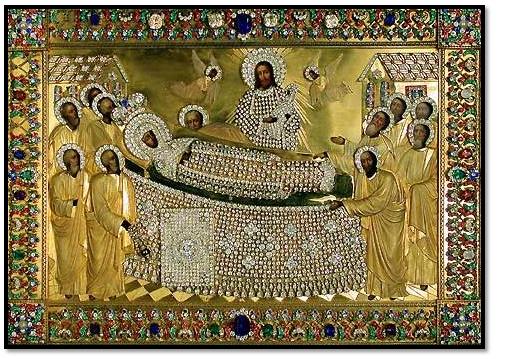
Reproduced
from the website of
St. John the Baptist Cathedral in Washington
www.stjohndc.org

